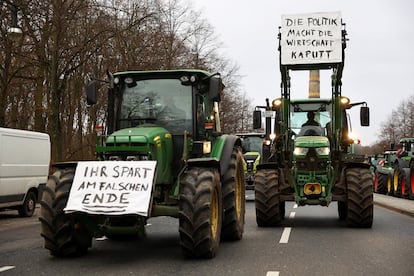German farmers put Scholz’s government on the ropes with a week of protests
Authorities are warning about the infiltration of right-wing extremists in demonstrations against cuts to tax breaks for the agricultural sector


Highway ramps blocked by long lines of tractors, motorists stuck in traffic jams on roads across the country, a production stoppage at the Volkswagen plant in Emden... The first day of the week of protests planned by German farmers against government cuts to agricultural subsidies achieved its goal: to become visible in the streets and make it clear that their struggle is not going to stop, despite the concessions that Olaf Scholz’s executive has already made to them.
The farmers’ actions have become a nightmare for the governing coalition of social democrats, greens and liberals, which has seen citizens sympathize with the protesters and take the traffic inconveniences in stride. Thousands of self-employed workers and workers in the agricultural sector will continue to participate in different protests throughout the country this week against a decision to phase out a tax break on agricultural diesel.
The German countryside has rebelled against what it considers an outrage and the prelude to its own bankruptcy. For now, the government has been unable to calm the sector. The protests are further straining a coalition already badly affected by constant infighting as it tries to battle recession, a decline in popularity and the rise of the far-right Alternative for Germany (AfD).
The cuts are part of the budget crisis that Germany is suffering after a controversial decision by the Constitutional Court in November that forced the government to review the accounts for 2023 and subsequent years, as well as the additional funds with which the German tripartite is financing the energy transition. The ruling has forced some belt-tightening in many areas, but especially in subsidies that are harmful to the environment, a major issue for the greens in government. The 2024 budget must be slashed by €17 billion to adjust to the new situation.
German farmers, who are heavily subsidized and enjoy numerous tax exemptions, declared war on the government in December with a large rally that brought central Berlin to a standstill with hundreds of tractors blocking major arteries of the capital. “We will not accept it,” the president of the agricultural producers’ association, Joachim Rukwied, warned defiantly. The fear that the German countryside would take up arms against the cuts caused the executive to reverse its initial forecast last week. Instead of canceling the agricultural diesel subsidy at once, it will do so gradually in three phases until 2026, and will give up its plan to eliminate a tax break for agricultural vehicles.

But with the fire already burning, the concessions — which some analysts view as privileges — have not been enough to appease a sector that has been protesting for years and is feeling overwhelmed by competition from other European and non-EU countries. Rukwied, who has become a regular fixture on the news these days, asked the public for “understanding” before the mobilizations began. He wants the government to completely withdraw its tax plans, that is, to leave things as they are and continue to return 21.48 cents per liter of diesel as it has until now.
The problem, however, goes further, according to the farmers’ leader: “It is about the future of our families, food security, the future of the country,” he emphasized. The banners at the protest in the capital, which brought several dozen tractors to the Brandenburg Gate, carried messages such as “You are cutting from the wrong place,” “Leave agricultural diesel alone” and “Let’s turn off the traffic light” (alluding to the nickname for the governing coalition because of their party colors).
A spokesperson for the executive on Monday ruled out reversing the measures again. Everything seems to indicate that Scholz will remain firm, despite finding himself in a difficult situation. His image will be damaged whether he accepts a new correction in favor of the farmers or if the protests continue.
Action against the vice chancellor
The protests are becoming controversial due to suspicions of infiltration by radical right-wing groups that, according to police reports, are joining the farmers’ demonstrations. A few days ago, Vice Chancellor and Economy Minister Robert Habeck, of the Greens and a regular target of anger, was confronted by an angry mob while returning by ferry from his Christmas vacation. About 100 protesters prevented him from leaving the ship in Schleswig-Holstein, in the north of the country. According to witnesses, the protesters shouted “Come out, you coward!” while carrying at least one banner with a gallows painted on it. The Prosecutor’s Office has opened an investigation.
The fear that the protests will become radicalized is spreading among the political class and the security forces. Federal President Frank-Walter Steinmeier stated that a dangerous line has been crossed: “Seeing a minister intimidated by an aggressive crowd on a private trip and having to flee to safety has shocked many in our country. Me too. We should not accept it,” he said. Habeck himself warned in a video message this Monday of the danger of infiltration by radical groups. “Calls are circulating with coup fantasies, extremist groups are forming and ethnic-nationalist symbols are being openly displayed,” he denounced.
Stephan Kramer, head of the intelligence office of Thuringia, a federal state where elections will be held next autumn and where the far-right AfD would win according to polls, shares the concern that the farmers’ protests are being exploited by right-wing extremists. “Any emotional issue is suitable for their strategy and will be used,” he told the newspaper Handelsblatt. Right-wing extremists have already tried to infiltrate “any form of legitimate civil protest,” he explained, referring to demonstrations against Covid pandemic restrictions, among others.
The farmers’ leader has condemned the events and distanced himself from the radical groups that want to take advantage of their actions to destabilize the government. “We don’t want them with us,” he said. “We are an organization that respects democratic norms. Personal attacks, insults, threats, coercion and violence have no place here.”
Sign up for our weekly newsletter to get more English-language news coverage from EL PAÍS USA Edition
Tu suscripción se está usando en otro dispositivo
¿Quieres añadir otro usuario a tu suscripción?
Si continúas leyendo en este dispositivo, no se podrá leer en el otro.
FlechaTu suscripción se está usando en otro dispositivo y solo puedes acceder a EL PAÍS desde un dispositivo a la vez.
Si quieres compartir tu cuenta, cambia tu suscripción a la modalidad Premium, así podrás añadir otro usuario. Cada uno accederá con su propia cuenta de email, lo que os permitirá personalizar vuestra experiencia en EL PAÍS.
¿Tienes una suscripción de empresa? Accede aquí para contratar más cuentas.
En el caso de no saber quién está usando tu cuenta, te recomendamos cambiar tu contraseña aquí.
Si decides continuar compartiendo tu cuenta, este mensaje se mostrará en tu dispositivo y en el de la otra persona que está usando tu cuenta de forma indefinida, afectando a tu experiencia de lectura. Puedes consultar aquí los términos y condiciones de la suscripción digital.








































